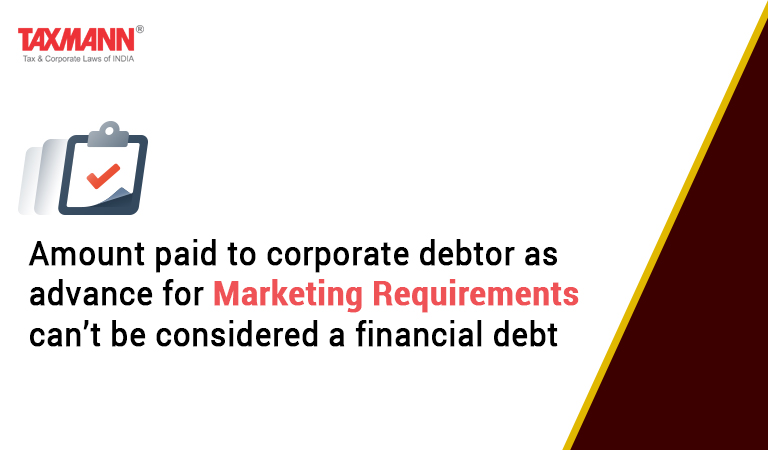Amount paid to corporate debtor as advance for marketing requirements cannot be considered a financial debt
- Blog|News|Insolvency and Bankruptcy Code|
- 2 Min Read
- By Taxmann
- |
- Last Updated on 15 December, 2025

Case details: Arrow Engineering Ltd. v. Golden Tobacco Ltd. - [2021] 128 taxmann.com 70 (NCLT - Ahd.)
Judiciary and Counsel Details
-
- MS. Manorama Kumari, Judicial Member, and Chockalingam Thirunavukkarasu, Technical Member
- Robin Jaisinghani and Ms. Natasha Dhruman Shah, Advs. for the Appellant.
- Dhaval Deshpande Adv. for the Respondent.
Facts of the Case
The Applicant entered into Letter of Intent (LOI) for disbursing advance for marketing/financial requirements of a development project to be undertaken by the respondent corporate debtor. An MoU was entered between parties in terms of which the corporate debtor would transfer 50 percent of constructed area to applicant post-development of property in full and final settlement of amount advanced by an applicant to the corporate debtor. The Applicant disbursed a partial amount as per terms of MoU.
NCLT Held
Relying on that MoU applicant filed an application under section 7 of the Code as MoU did not contain vital information like date of execution of the document, address of both parties between whom MoU had been entered into and number/date of cheque claiming to have been given by the applicant to the respondent.
Consequently, MoU became a piece of simple paper in the eye of the law, having no evidentiary value, and the advance amount paid could not be considered as ‘financial debt’ or ‘operational debt’ as an arrangement between applicant and respondent was in nature of business sharing. The NCLT stated that there was no financial debt, an application under section 7 was not maintainable.
Cases Referred To
- Motilal Padampat Sugar Mills Co. Ltd. v. State of Uttar Pradesh 1979 taxmann.com 210 (SC) (para 14).
Disclaimer: The content/information published on the website is only for general information of the user and shall not be construed as legal advice. While the Taxmann has exercised reasonable efforts to ensure the veracity of information/content published, Taxmann shall be under no liability in any manner whatsoever for incorrect information, if any.

Taxmann Publications has a dedicated in-house Research & Editorial Team. This team consists of a team of Chartered Accountants, Company Secretaries, and Lawyers. This team works under the guidance and supervision of editor-in-chief Mr Rakesh Bhargava.
The Research and Editorial Team is responsible for developing reliable and accurate content for the readers. The team follows the six-sigma approach to achieve the benchmark of zero error in its publications and research platforms. The team ensures that the following publication guidelines are thoroughly followed while developing the content:
- The statutory material is obtained only from the authorized and reliable sources
- All the latest developments in the judicial and legislative fields are covered
- Prepare the analytical write-ups on current, controversial, and important issues to help the readers to understand the concept and its implications
- Every content published by Taxmann is complete, accurate and lucid
- All evidence-based statements are supported with proper reference to Section, Circular No., Notification No. or citations
- The golden rules of grammar, style and consistency are thoroughly followed
- Font and size that’s easy to read and remain consistent across all imprint and digital publications are applied



 CA | CS | CMA
CA | CS | CMA
